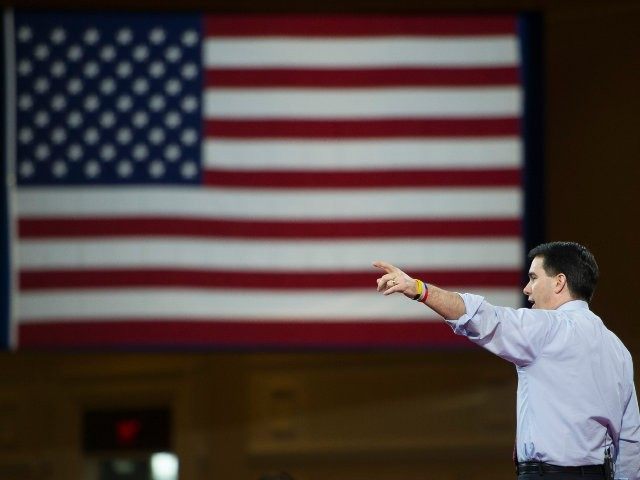Before the end of March, Wisconsin will likely become the 25th state to allow workers the choice of whether or not to join a union. With the pending enactment of a so-called “Right to Work” law, Wisconsin will join Indiana, Iowa and Michigan as the only Midwestern or Northeastern states without compulsory union membership. It could also power Wisconsin Governor Scott Walker to the Republican nomination.
It could be said that Walker’s campaign for the nomination began in 2011, when he pushed Act 10, a law stripping public sector employees of many collective bargaining rights, through the legislature. The proposal set off furious protests from labor unions, who occupied the state Capitol for weeks.
Act 10 sparked a series of recall elections against several state Senators and Walker himself. There was also a vigorous campaign for a seat on the state Supreme Court, with the ultimate constitutionality of the law hanging in the balance. Walker and his allies prevailed in those contests.
Walker went on to win reelection in 2014, giving him victories in three heavily contested, statewide elections in just four years. Few politicians have won such a succession of high-profile campaigns in so short a time, especially in a political swing state such as Wisconsin.
Walker’s victories on Act 10, in fact, propelled Indiana and Michigan, two states with a heavy union presence, to pass right-to-work laws for all employees in 2012. These efforts, in turn, pushed Wisconsin to pursue its current right-to-work proposal. Passage of these right to work laws in the upper Midwest is an enormous blow to labor unions. Under these laws, unions will have to convince individual workers that union dues are a good value, rather than simply expropriating a share of their paycheck.
It could easily be argued that these reforms are the most substantive legislative accomplishments for conservatives over the past five years. They not only maximize freedom, by giving individuals a choice over joining a union, but they also limit the financial resources unions have to lobby and organize for increased government power.
The reforms themselves are not a potential road map for a Walker presidency. Although the media ignore this fact, federal public sector unions enjoy right-to-work benefits and generally don’t have collective bargaining rights. No less a figure than Franklin Delano Roosevelt warned about the dangers of even allowing public sector employees to join a union. President Obama has wisely followed his predecessors and chosen not to extend collective bargaining to federal employees.
What the reforms do show, however, is Walker’s ability to win conservative reforms and push conservative policy in a highly competitive swing state. His is not the case of a conservative winning approval for policies in an already conservative state. Politically, Walker isn’t bringing coals to Newcastle.
Rather, his victories have come in a state which hasn’t supported the Republican nominee for president in more than 30 years. It is a deeply purple state with a long progressive history. Wisconsin was the first state to allow public sector employees to unionize. It was also, though, the birthplace of the Republican party, born of a strong opposition to slavery.
It has been at the forefront of many political reform movements. Walker’s candidacy could write another chapter in the state’s political history.
For six years, the conservative movement has been sustained by speeches and impassioned rhetoric. These vocal appeals to our nation’s founding principles have sparked and nurtured a nationwide grass roots movement and awakening of political activism.
Riding this rhetoric to majority control of Congress has cauterized the wounds inflicted by an overreaching government, but has done little to roll back the leviathan. There comes a time when speeches must recede and allow action to take their place.
It remains to be seen whether Walker is up to the task for a national campaign for the Republican nomination. His campaign’s recent handling of media-generated controversies suggests it doesn’t yet recognize its potentially powerful position with the Republican base. His campaign seems to be playing by a rulebook Walker never employed during his fights in Wisconsin.
He would not be the first governor with a solid record of achievement to stumble on the national stage. At the same time, his successes in Wisconsin, against powerful institutions and an independent electorate, cannot be overstated. If he sticks to that game plan, he will be a formidable force in the coming campaign.

COMMENTS
Please let us know if you're having issues with commenting.